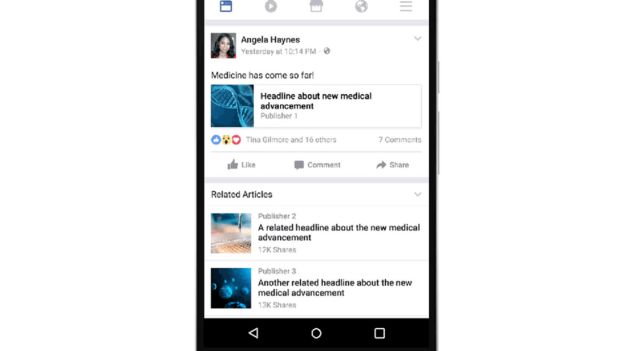Facebook is to step up its efforts to fight fake news by sending more suspected hoax stories to fact-checkers and publishing their findings online.
It follows mounting criticism of the social media firm for not doing enough to root out fake news on its platform.
It has also just launched a new feature in four countries that will publish alternative news links beneath problematic articles.
But several experts said the measures did not do go far enough.
“Presenting audiences with context is helpful,” said Tom Felle, a senior lecturer in digital journalism at City University.
“But it does nothing to stop the spread of this material, or to stop traffic going to fake news peddlers who are making money out of creating this material.”
 Facebook has been criticised as being one of the main distribution points for fake news, which many think influenced the 2016 US presidential election.
Facebook has been criticised as being one of the main distribution points for fake news, which many think influenced the 2016 US presidential election.
Voters were also flooded with hoax stories during the French presidential election in May.
‘Updated AI’
The firm has previously been reluctant to take down potentially fake news stories, arguing that it does not want to be an “arbiter of truth”.
Instead it identifies potentially false stories through a mixture of artificial intelligence (AI) and user detection. These are then sent to independent fact-checkers who place a flag next to hoax stories to alert readers.
On Thursday, however, the firm said it would start using “updated machine learning” to enhance detection.
“If an article has been reviewed by fact checkers, we may show the fact-checking stories below the original post,” added Sara Su, product manager of News Feed, in a blog.
A spokesman later clarified that these stories would not be “direct responses” to fake articles, but factually accurate reports that offered an alternative.
‘Related articles’
On Thursday, the firm rolled out a new “Related articles” feature in the US, France, Germany and the Netherlands.
The feature, which the firm has been testing since April, places links to other news coverage beneath highly popular or questionable stories, offering users “more perspectives and additional information”.
Brooke Binkowski, managing editor of fact-checking magazine Snopes, told the BBC: “I applaud their efforts to ‘flood out’ fake news, a method of which I have been a proponent for a long time.”
However, she said that while AI was “a good tool, it is also a blunt one”.
Mr Felle said if the firm really wanted to stop fake news, it needed to back the news industry in a better way.
“If Facebook wants to help journalism it needs to put its hand in its pocket and support quality, trusted news organisations to better reach audiences, and advertisers.”






